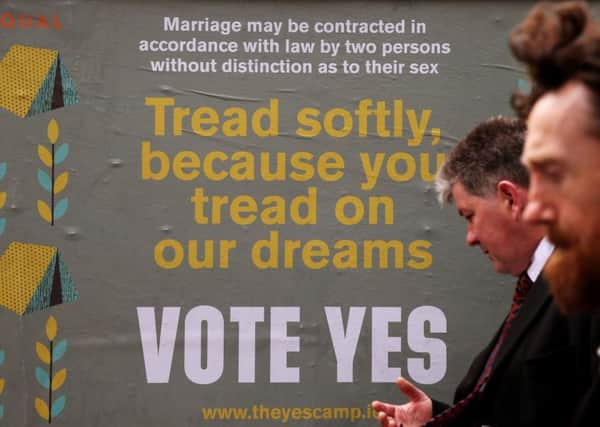Unionism needs fresh ideological tools and touchstones if it is to thrive


Commentators and pro-union activists with a presence on social media and print, debate the potential of an emerging ‘liberal unionism’, and possible creation of a liberal unionist political party.
Views vary as to the merits, practicalities and pitfalls which might attach to any actions or project which could develop.
Advertisement
Hide AdAdvertisement
Hide AdThe legitimate question of what it might look like has been tabled and this, with others, adds energy and focus to the discourse.
A starting point for discussion must surely be to walk back through the recent performance and record of various branches of political unionism and address what has brought them to the place where they sit today.
In doing so, it is important to acknowledge that a large number of voters continue to place their preference for unionist parties, however, the recent results, as evidenced by the level of turnout and increase in the pro-union vote for the Alliance party, point to significant decline in this constituency.
At the crossroads?
Unionism is beginning to struggle in a world no longer designed to accommodate it.
Advertisement
Hide AdAdvertisement
Hide AdThe UUP seems intent on continuing its lapse into a past world of traditional unionism and pretend holding together.
The political bravado of TUV style unionism which uses bluster as its business model, sitting alongside the politics of a DUP espousing a superficial and highly selective moral relationship between politics, culture and lifestyle has rendered semi-stranger status to unionism within the wider United Kingdom.
No dismissive rubbishing of inconvenient evidence can detract from this and the response that is emerging. A growing constituency which is pro-union and wants to see a return to the spirit of the Good Friday Agreement sees political unionism as toxic and rejects orthodox unionist terminology with its binary identities.
It does not see in current Unionist leaders the capacity to move beyond platitudinal aspirations, to take strategic actions that will deliver a pluralist community in which we can achieve important outcomes for all sections of society.
Advertisement
Hide AdAdvertisement
Hide AdThe result is a tug from below setting an agenda of uncomfortable questions for unionist leaders to face up to. Answers, couched in defensive rhetoric which appropriates democracy as opposed to creating it, will not suffice. Any unionist inclined to see impetus for change as a trojan horse would do well to consider that the existence of too many strongholds maintained to resist the onset of a pluralist and inclusive community is the real problem.
Unionism of this nature, in refusing to soften ideological rigidity and shepherd change, plays a leading role in its own demise.
There is no escaping that when you have left yourself with no worthwhile banner, you start to march behind worthless ones. Eroding notions of public and shared hope asset strips the future that people desire and so they react accordingly.
Acht na Gaeilge
The proposal for a Gaelic Language Act is a case in point. Some unionists may not like it, an issue in itself they may need to address, but it does not mean that genuine language enthusiasts do not have a right to it.
Advertisement
Hide AdAdvertisement
Hide AdFreedom and rights for a chosen few is no rights at all. Where is the justification for a political ideology wanting to extend its domination into the realms of culture and ideas?
As the wider community is displaying, connections to and engagement with Gaelic culture and language is not incompatible with a strong commitment to the Union and can be a positive reflection of modern British cultural diversity, bringing Northern Ireland into line with Scotland and Wales.
Unionism should be promoting a creative and principled solution and not allow itself to be defined by those who want to claim that the Gaelic Language is a weapon of so-called de-colonisation. This stance represents a retreat into the fantasy of predatory republicanism and H Block sight and sound.
As with the GFA process, it is an attempt to take forceful ownership of culture and lock it into a particular agenda.
Advertisement
Hide AdAdvertisement
Hide AdIt should not be allowed to detract from the educational, social and cultural enrichment of preserving and promoting minority languages in an increasingly shared and diverse community of multi-layered identities.
This can sit comfortably within a wider debate as to why we deny children in primary schools the opportunity to access the many educational, economic and cognitive benefits of speaking multiple languages, as is the norm in most other countries in Europe.
The union should be seen as a continual and accommodating productive process of dynamism and renewal, but leaders have opted to continue the spirit of donning red berets and leading followers along village streets or marching them into politically rutted trenches.
Inclusive unionism
Many of the Union’s dividends are being risked and the refusal to alter course opens a dangerous gap between the expectations of voters and what unionism is actually delivering in terms of cultural diversity and respect for individual life choices and dignity.
Advertisement
Hide AdAdvertisement
Hide AdIn the antithesis of what British unionism should be, and to the frustration of an increasingly vocal proportion of pro-Union voters, Britishness in Northern Ireland is in some instances being distorted so as to become a handicap when compared to the rest of the United Kingdom.
Unionists, especially young people who live and work in other regions of the United Kingdom, speak of the resulting social disconnect.
Within Northern Ireland, the real benefits of being linked to the Commonwealth and one of the biggest economies in the world are lessened by the denial of cultural expression and civil rights, which force its citizens to travel elsewhere to get married and receive adequate healthcare.
This carries too much resonance of past failings and political supremacy. There is more than one legacy issue which unionism has to address.
Liberal or otherwise, unionism today needs an infusion of fresh ideological tools and touchstones.